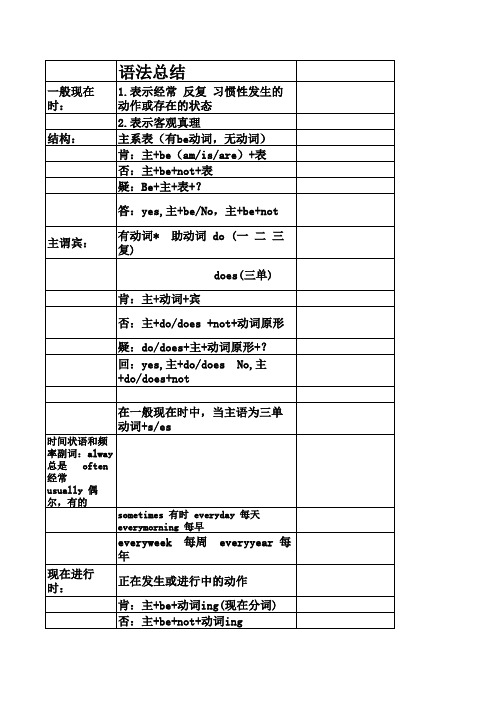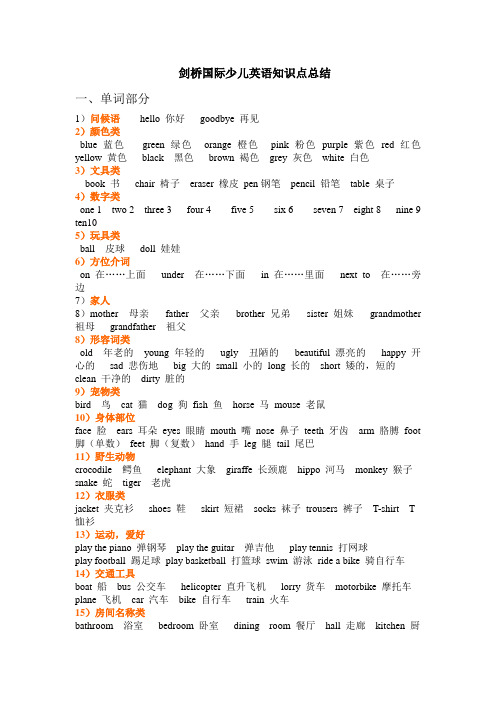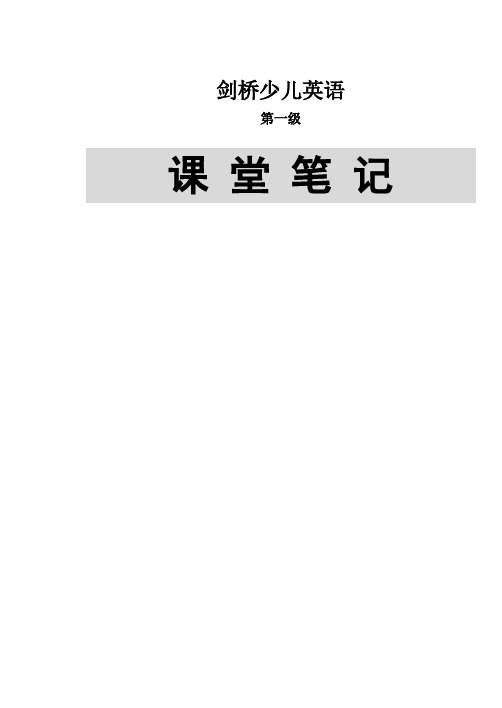剑桥初级语法 整理笔记
剑桥1

时间状语和频率副词:alway总是 often 经常 usually 偶尔,有的 sometimes 有时 everyday 每天 everymorning 每早
everyweek 每周 everyyear 每年 现在进行时:正在发生或进行中的动作 肯:主+be+动词ing(现在分词) 否:主+be+not+动词ing 疑:Be+主+动词ing+? 回:yes,主+be No,主+be+not 一般将来时:计划,打算做某事 肯:主+be going to +动词原形/地点 否:主+be not going to+动词原形/地点+? 疑:Be+主+going to+动词原形/地点+? 回: yes, 主+be No,主+be+not 指示代词: 单数: this that 近 远 复数:these those
剑桥初级英语语法讲义 6 (5)

UNIT 11 一般过去时一般过去时态:表示过去某一时间所发生的动作或存在的状态。
谓语动词要用一般过去式。
经常与yesterday(昨天), last week(上周), last month(上个月), last year(去年), two months ago(两个月前), the day before yesterday(前天),in 1990 (在1990年), in those days (在那些日子里)等表示过去的时间状语连用。
如:I was born in 1990. (我出生在1990年)。
When did you go to the park? (你是什么时候去的公园)。
I went to the park last week. (我是上周去的公园)在上面的句子中第一句属于be动词的一般过去时态;第二句和第三句属于实义动词的一般过去时态。
1.Be 动词的一般过去时态在没有实义动词的句子中使用be动词,am is 的过去式为was; are的过去式为were.构成:肯定句:主语+was (were) +宾语如:I was late yesterday. (昨天我迟到了。
)否定句:主语+was (were) +not+宾语如:We weren't late yesterday. (我们昨天没迟到)疑问句:Was (Were) +主语+宾语如:Were you ill yesterday? (你昨天病了吗?)肯定回答:Yes, I was. (是的,我病了。
)否定句:No, I wasn't. (不,我没病。
)特殊疑问句:特殊疑问词+was (were) +主语+宾语如:When were you born? 你是什么时候出生的?2.实义动词的一般过去时态肯定句要使用动词的过去式,否定句和疑问句要使用助动词do和does 的过去式did.肯定句为:主语+动词过去式+宾语如:I went home at nine o'clock yesterday.(我昨天九点钟回的家。
剑桥国际少儿英语知识点总结

剑桥国际少儿英语知识点总结一、单词部分1)问候语hello 你好goodbye 再见2)颜色类blue 蓝色green 绿色orange 橙色pink 粉色purple 紫色red 红色yellow 黄色black 黑色brown 褐色grey 灰色white 白色3)文具类book 书chair 椅子eraser 橡皮pen钢笔pencil 铅笔table 桌子4)数字类one 1 two 2 three 3 four 4 five 5 six 6 seven 7 eight 8 nine 9 ten105)玩具类ball 皮球doll 娃娃6)方位介词on 在……上面under 在……下面in 在……里面next to 在……旁边7)家人8)mother 母亲father 父亲brother 兄弟sister 姐妹grandmother 祖母grandfather 祖父8)形容词类old 年老的young 年轻的ugly 丑陋的beautiful 漂亮的happy 开心的sad 悲伤地big 大的small 小的long 长的short 矮的,短的clean 干净的dirty 脏的9)宠物类bird 鸟cat 猫dog 狗fish 鱼horse 马mouse 老鼠10)身体部位face 脸ears 耳朵eyes 眼睛mouth 嘴nose 鼻子teeth 牙齿arm 胳膊foot 脚(单数)feet 脚(复数)hand 手leg 腿tail 尾巴11)野生动物crocodile 鳄鱼elephant 大象giraffe 长颈鹿hippo 河马monkey 猴子snake 蛇tiger 老虎12)衣服类jacket 夹克衫shoes 鞋skirt 短裙socks 袜子trousers 裤子T-shirt T 恤衫13)运动,爱好play the piano 弹钢琴play the guitar 弹吉他play tennis 打网球play football 踢足球play basketball 打篮球swim 游泳ride a bike 骑自行车14)交通工具boat 船bus 公交车helicopter 直升飞机lorry 货车motorbike 摩托车plane 飞机car 汽车bike 自行车train 火车15)房间名称类bathroom 浴室bedroom 卧室dining room 餐厅hall 走廊kitchen 厨房living room 客厅16)食物类apple 苹果banana 香蕉burger 汉堡cake 蛋糕chocolate 巧克力ice cream 冰激凌orange 橘子二、句型部分Unit 1一、应掌握句型1)Hello,I’m……2)I’m ten.(数字一到十)3)Goodbye二、只需听懂的句型1)What’s your name?2)How old are you?Unit 2一、应掌握句型1)How are you?2)I’m fine,thank you.Unit 3 (无)Unit 4一、应掌握句型1)She/He’s beautiful/uglyUnit 5(无)Unit 6一、应掌握句型1)I have got……二、只需听懂的句型1)Have you got……?Unit 7一、应掌握句型1)They have got……Unit 8二、只需听懂的句型He/She has got……Unit 9一、应掌握句型1)I can……2)I can’t……Unit10一、应掌握句型1)I’m walking,flying,driving,sleeping, swimming二、只需听懂的句型1)What are you doing?Unit11一、应掌握句型1)I’m bathing,watching,eating,cooking Unit 12一、应掌握句型1)I like……2)I don’t like……3)Do you like……?4)Yes,I do./No,I don’t.。
剑桥初级英语语法

剑桥初级英语语法剑桥初级英语语法:内容简介:《剑桥英语语法》易于使用:书中一面是语法讲解、相对的一面是讲解过的语法内容的练习。
书后的附加练习提供了更多的练习题。
用深入浅出的语言讲解了中级英语水平学生常见的语法内容。
为自学设计:在学习指导的帮助下,学生可以选择学习他们认为有困难的语法内容。
目录和索引帮助学生很容易找到他们学习的每一单元内容。
书后附有所有练习答案。
书评:《剑桥英语语法》包括36个单元,每个单元重点讲解一个语法项目。
有些较难的语法项目需要2个或更多的单元。
每单元的详细内容请参见目录。
每单元的内容分布在相对应的两页上,左边一页是语法项目的讲解,右边是练习。
书后附有练习答案。
书后还有7个附录,详细讲述了不规则动词、动词的各种形式、拼写法及美国英语等。
目录:现在时与过去时:1 现在进行时(I am doing)2.一般现在时(I do)3.现在进行时与一般现在时(1)(I am doing与I do)4.现在进行时与一般现在时(2)(I am doing与I do)5.一般过去时(I did)6.过去进行时(I was doing)现在完成时与过去完成时:7.现在完成时(1)(I have done)8.现在完成时(2)(I have done)9.现在完成进行时(I have been doing)10.现在完成进行时与现在完成时(I have been doing 与I have done)11.How long have you (been)12.When...?与How long...? For 与since13.现在完成时与一般过去时(1)(I have done 与I did)14.现在完成时与一般过去时(2)(I have done 与I did)15.过去完成时(I had done)16.过去完成进行时(I had been doing)17.Have 与have goted to (do)将来时:19.现在时(I am doing/I do)表示将来20.(I’m) going to (do)21.Will/shall(1)22.Will/shall(2)23.I will 与I’m going to24.Will be doing 与will have done25.When I do/When I’ve done When 与if剑桥英语语法易错点考前梳理(一):主动结构表被动:(1) open,lock,write,read,sell,wash,cut,burn,drive等词作不及物动词时,它们的主语为物,可以用主动语态表被动意义。
剑桥入门语法总复习

剑桥入门语法总复习1对1个性化辅导代词1.含义代词是为了避免重复而用来代替名词的词,大多数代词具有名词和形容词的作用。
2.人称代词1)表示“我”、“你”、“他(她、它)”、“我们”、“你们”、“他们”的词叫做人称代词。
2)变化形式数人称词义格主格宾格3)用法1)当几个代词同时作主语时,其顺序一般是:单数:you,heandI复数:we,youandthey.2).表示国家、大地、船只、月亮等名词常用he来替代(un则常用he)。
例如:Chinaimymotherland.Shein’twhatheuedtobe.3.物主代词1)表示所有关系的代词叫物主代词。
物主代词包括形容词性的物主代词和名词性的物主代词。
2)变化形式数人称词义种类形容词性的物主代词名词性的物主代词3)用法①形容词性的物主代词在句中作定语。
单数一我I二你三他她它一我们weu复数二你们youyou三他们theythemyouheheitmeyouhimherit单数一我的二你的三他的她的它的一复数二三他们的我们的你们的myyourhiheritourouryouryourtheirtheirmineyourhiherit1对1个性化辅导例如:Todayihibirthday.②名词性的物主代词常用来避免前面已提及的名词,在句中作主语、表语、宾语。
例如:Thiiyourbackpack,mineionthefloorunderthebed.高分突破:名词性的物主代词常用在of后作定语。
例如:Afriendofminecametoeemeyeterday.选词填空:1.What’________name(you/your)_________nameiBob.(My/I/me)2._ ________eraerarein________drawer.(her/he/Her/She)3.Can________(y ou/your)do_______(you/your)homework4.___________iacat.________na meiMimi.(it/it/It/It)5._________brothercanpeakJapanee.(He’/Hi/H e)6.Pleaetake_________keytochool.__________areonthetable.(they /their/them/They/Their/Them)7.__________ithirteenyearold._______ ___birthdayiMarch1t.(He/Hi/Him)8.__________favoritevegetableitom ato.(her/he/Her/She)9.Canyouhelp______(we/u/our)Pleaetake______tochool.(they/the ir/them)10._________can’tee_________baeball.It’behind_________ .(My/I/me/my)11.Yourchoolimall,_______ibig.(my)12.Thiinotyourpen._______ionthedek.(your)13.WhoebookithatIt’_______.(her)14.Herbikeiblack._______igrey(he)._______iblue.(my)15.Thoearen’tourboo k._______areontheflo or.(our)thi,that和it用法(1)thi和that是指示代词,it是人称代词。
剑桥初级语法 整理笔记

现在时3、现在进行时:I am doing 以下动词不可用于现在进行时:4、现在进行时的疑问式:Are you doing?5、一般现在时:I do/work/like 等一般现在时用来表示一般性的事实、有时或经常发生的事情:I like big cities.Always/never/often/usually/sometimes 常与一般现在时连用:I never eat breakfast.6、一般现在时的否定式:I don ’t /he doesn ’t + 动词原形 I don ’t have a bath every day.【every day 表每天,作状语; everyday 表每天的,形容词】 7、一般现在时的疑问式:D o you…?*What do you do? 表示“你是做什么工作的?”8、have/have got(1)(2)have 表“吃、喝、拿”时,不能用have got代替(3)下列短语中,要用have15、现在完成时(1)have done(2)just/already/yetJust表“刚才”:we’ve just arrived.Already表“已经”(在预料之前):they’ve already arrived. (=before you expected)Yet表“直到现在”(用于否定句和疑问句中):they haven’t arrived yet.(3)现在完成时与ever(用于疑问句中)/never连用:Have you ever played golf?(4)gone表“去而未归”:she has gone to China.Been表“去而已归”:he has been to China.(5)H ow long have you…?She has been in Ireland since Monday/for three days.25、what are you doing tomorrow?I am doing something tomorrow 表示“我已经安排好明天要做某事/我计划明天做某事”I am going to do something.同上(be going to 与 will 的区别)注意:用一般现在时表示时间表、节目单、火车与公共汽车时刻表等:The train arrives at 7.30.27、will/shall(1) I shall =I will、we shall=we will :I shall be late tomorrow. = I will be late tomorrow.在构成将来时的时候,不可将shall与you/they/it/he/she等非第一人称连用:Tom will be late. (而不能 Tom shall be late.)(2)I’ll …表“提议或决定做某事”:I’ll phone you tomorrow.I think I’ll/I don’t think I’ll…表“决定做某事”:I think I’ll go to bed early tonight.(3)Shall I…/Shall we…? 表“你认为…好吗?”28、might=may29、can/could:could为过去式30、must/mustn’t/don’t need to(1)表示过去时,用had to而不用must:We had to walk home last night.(2)don’t need to = don’t have to31、should(1)I think…should/I don’t think….should/do you think…should?(2)ought to =should32、I have to(1)表过去时,用had to(2)表示认为有必要做某事或提出个人看法时,must或have to都可以不是表个人看法时,只能用have to:Eg: You can’t park your car here for nothing. You have to pay. (非个人看法)I t’s a fantastic film. You must see it./You have to see it.33、I used to/I didn’t used to/did you use to…?38、there has been/there have been41、反义疑问句Have you?/are you?/don’t you? 表“对某事感兴趣或感到惊奇”:——I’ve bought a new car.——Oh, have you?记住:前否后肯,前肯后否It’s a nice day, isn’t it?That isn’t your car, is it?42、too/either so am I/neither do I(1)(2)both+复数名词either/neither单数名词,谓语动词用单数44、疑问句(1)is it…?/have you…?/do they…?why isn’t…?/why don’t…?(2)who saw you?/who did you see?(3)以特殊疑问词开头的句子,介词位于句尾:where are you from?(4)what’s it like?/what are they like? 表询问某事物的情况——新旧、好坏、大小等(5)疑问词52、不定式与-ing 形式 动词+不定式 动词+-ing动词+-ing或不定式55、56、57、do 与 make66、名词在英语中,下列词语以复数出现:以下名词通常不可数73、the的用法77、not + any/no/more(1)not + any=no….=not a(2)no…通常用于have(got)与there is/are之后(3)动词否定形式+any =动词肯定形式+no(4)no之后接名词、none可单独使用None表示“无”;no-one表示“没人80、every/all(1)every +单数名词,谓语动词用单数(2)everywhere 是副词83、a lot/ much/many/(a)little/(a)few (1)a lot of + 可数/不可数,也可不跟名词(2)much+不可数,用于否定句与疑问句,也可不跟名词 (3)many+复数 (4)88、a bit older/ much older A bit older than….A bit more difficult than…Much better than…Much more expensive than… 89、not as …as Not as much as…. Not as many as… The same as….90、the oldest/ the most expensive可用最高级+I ’ve ever…./ you’ve ever….等:The film was very bad. I think it’s the worst film I’ve ever seen. What is the most unusual thing you’ve ever done? 91、enough/too93、词序(1)地点状语位于时间状语之前:we went to a party last night.(2)always/never/often 等词用于动词之前,be 动词之后,两个动词之间: I always drink coffeein the morning.I am always tired.I will always remember you. / I can never find my keys.96、give/ lend/pass/send/show/buy/getgive sth to sbgive sb sth注意:当某物为代词it或them时,用第一种结构比较好:I gave it to my father.98、when(1)当以when开头时,两部分用逗号隔开:When I went out, it was raining.(2)一般现在时用于when之后表示将来:Lisa will be in Mexico when Sarah is in New York.When I get home this evening, I’m going to have a shower.(3)before/while/after/until的用法类似:Please close the window before you go out.I’ll wait here until you come back.99、if(1)if之后常用一般现在时:If you see Ann tomorrow, can you ask her to call me?What shall we do if it rains?(2)if I/you/he/she/they/it had……I/you/he would….if I/it/he/she was…或if I/it/he/she were….(这里的动词都是过去式)在这种句子里,句意表示事实上这个假设不成立:If I had the money, I would buy a fast car.事实上我没有钱买车。
剑桥少儿英语 第一级 课堂笔记(独家版本)

剑桥少儿英语第一级课堂笔记上册Unit 1 What's your name?1. What's your name (please)?My name is Andy / Liu / Dehua.I am Andy / Liu / Dehua.英文名首字母大写;汉语名姓首字母大写,名首字母大写。
2. 介绍朋友:I am → I'm be 动词am are is (是,在)he is → he'sshe is → she's 记忆歌:我用amit is → it's 你用arewe are → we're is跟着他、她、它they are → they're 复数一律用长are3. How old are you?I am 7(Yours old).4. Boy's name: Ted Jeff…Girl's name: Kelly Meg…5.①come [kʌm] 来→(反)go [ɡo] 去②Let's play. 让我们玩。
△Let's = Let us + do (动词原形).③It's time to get up.△time [tɑim] 时间get up 起床It's time to do.6.* Mr. [mistə] 先生+ 姓氏(在学校中有“老师”的意思。
)Miss [mis]小姐+ 姓氏(在学校中有“老师”的意思。
)You are…你是……。
7.8. Come in, please. 请进。
close →(反) openGo to school. 上学。
don't = do not 不要be late [leit] 晚的,迟到learn [lə:n] 学习,学会again and again [ə'ɡein] 一次又一次地9. What's your name? (你的)My name is…I am…What's his name? (他的)His name is…He is…What's her name? (她的)Her name is…She is…10. 语音 a [æ]: Dan bag mat cape [e]: Ben pen leg neckUnit 2 What's this?1. What's this? this →(反) thatWhat's that? =>It's a …(当该句用于询问字母时,答句中无“a”,即It's “B”.)What's this in(△用) English? It's a …2. ①letter ['letə] 字母,信letter“A”②jump [ʤʌmp]v.跳③ A a B b C c D d E e F f G g[ei] [bi:] [si] [di:][i:] [ef] [ʤi:]H h I i J j K k L l M m N n[eiʧ] [ɑi] [ʤei] [kei] [el] [em] [en]O o P p Q q R r S s T t[əu] [pi:] [kju:] [ɑ:] [es] [ti:]U u V v W w X x Y y Z z[ju:] [vi:] ['dʌblju:] [eks] [wɑi] [zi:][zed]元音字母:a e i o u剩下的都是辅音字母。
剑桥语法知识点总结

剑桥语法知识点总结剑桥语法知识点是英语学习中非常重要的一部分,掌握好剑桥语法知识点对提高英语水平非常有帮助。
在考试中,如果能掌握好剑桥语法知识点,可以帮助我们更好地理解和使用英语,提高我们的得分。
下面是一些剑桥语法知识点的总结。
一、主谓一致主谓一致是指主语和谓语在人称和数上保持一致。
在英语的基本句型中,主语和谓语的一致性是非常重要的,否则句子就会出现语法错误。
1. 单数主语与单数谓语例如:The cat is sleeping.2. 复数主语与复数谓语例如:The cats are sleeping.3. 特殊情况(集体名词、不可数名词、单数形式)例如:The team is winning.例如:The water is boiling.例如:The news is good.二、动词时态动词时态表示动作或者状态发生的时间,包括一般现在时、一般过去时、一般将来时、现在进行时、过去进行时、将来进行时、现在完成时、过去完成时、将来完成时等。
掌握好动词时态的用法,可以帮助我们正确地表达出我们的意思。
1. 一般现在时表示现在进行的动作或者状态,一般现在时用于表示经常性的动作或常态。
例如:I play football every day.2. 一般过去时表示过去发生的动作或者状态,一般过去时用于某个过去的时间。
例如:I played football yesterday.3. 一般将来时表示将来要发生的动作或者状态,一般将来时用于表示将来的某个时间。
例如:I will play football tomorrow.4. 现在进行时表示现在正在进行的动作,现在进行时用于表示现在正在进行的动作。
例如:I am playing football now.5. 过去进行时表示过去正在进行的动作,过去进行时用于表示过去某个时间正在进行的动作。
例如:I was playing football when it started raining.6. 将来进行时表示将来某个时间正在进行的动作,将来进行时用于表示将来某个时间正在进行的动作。
- 1、下载文档前请自行甄别文档内容的完整性,平台不提供额外的编辑、内容补充、找答案等附加服务。
- 2、"仅部分预览"的文档,不可在线预览部分如存在完整性等问题,可反馈申请退款(可完整预览的文档不适用该条件!)。
- 3、如文档侵犯您的权益,请联系客服反馈,我们会尽快为您处理(人工客服工作时间:9:00-18:30)。
现在时
3、现在进行时:I am doing
4、现在进行时的疑问式:Are you doing?
5、一般现在时:I do/work/like等
一般现在时用来表示一般性的事实、有时或经常发生的事情:I like big cities. Always/never/often/usually/sometimes常与一般现在时连用:I never eat breakfast.
6、一般现在时的否定式:I don’t/he doesn’t + 动词原形
I don’t have a bath every day.
【every day 表每天,作状语; everyday 表每天的,形容词】
8、have/have got
(3)下列短语中,要用have
15、现在完成时
(1)have done
(2)just/already/yet
Just表“刚才”:we’ve just arrived.
Already表“已经”(在预料之前):they’ve already arrived. (=before you expected)Yet表“直到现在”(用于否定句和疑问句中):they haven’t arrived yet.
(3)现在完成时与ever(用于疑问句中)/never连用:Have you ever played golf?
(4)gone表“去而未归”:she has gone to China.
Been表“去而已归”:he has been to China.
(5)H ow long have you…?
25、what are you doing tomorrow?
I am doing something tomorrow 表示“我已经安排好明天要做某事/我计划明天做某事”
I am going to do something.同上(be going to 与will 的区别)
注意:用一般现在时表示时间表、节目单、火车与公共汽车时刻表等:The train arrives at 7.30.
27、will/shall
(1)I shall =I will、we shall=we will :
I shall be late tomorrow. = I will be late tomorrow.
在构成将来时的时候,不可将shall与you/they/it/he/she等非第一人称连用:
Tom will be late. (而不能Tom shall be late.)
(2)I’ll …表“提议或决定做某事”:I’ll phon e you tomorrow.
I think I’ll/I don’t think I’ll…表“决定做某事”:I think I’ll go to bed early tonight.
(3)Shall I…/Shall we…? 表“你认为…好吗?”
28、might=may
29、can/could:could为过去式
30、must/mustn’t/don’t need to
(1)表示过去时,用had to而不用must:We had to walk home last night.
(2)don’t need to = don’t have to
31、should
(1)I think…should/I don’t think….should/do you think…should?
(2)ought to =should
32、I have to
(1)表过去时,用had to
(2)表示认为有必要做某事或提出个人看法时,must或have to都可以不是表个人看法时,只能用have to:
Eg: You can’t park your car here for nothing. You have to pay. (非个人看法)
I t’s a fantastic film. You must see it./You have to see it.
33、I used to/I didn’t used to/did you use to…?
41、反义疑问句
Have you?/are you?/don’t you? 表“对某事感兴趣或感到惊奇”:
——I’ve bought a new car.
——Oh, have you?
记住:前否后肯,前肯后否
It’s a nice day, isn’t it?
That isn’t your car, is it?
42、too/either so am I/neither do I
(1)
(2)both+复数名词
44、疑问句
(1)is it…?/have you…?/do they…?why isn’t…?/why don’t…?
(2)who saw you?/who did you see?
(3)以特殊疑问词开头的句子,介词位于句尾:where are you from?
(4)what’s it like?/what are they like? 表询问某事物的情况——新旧、好坏、大小等(5)疑问词
52、不定式与-ing形式
动词+不定式
动词+-ing
动词+-ing或不定式
66、名词
在英语中,下列词语以复数出现:
77、not + any/no/more
(1)not + any=no….=not a
(2)no…通常用于have(got)与there is/are之后
(3)动词否定形式+any =动词肯定形式+no
(4)no之后接名词、none可单独使用
80、every/all
(1)every +单数名词,谓语动词用单数
(2)everywhere 是副词
83、a lot/ much/many/(a)little/(a)few
(1)a lot of + 可数/不可数,也可不跟名词
(2)much+不可数,用于否定句与疑问句,也可不跟名词(3)many+复数
(4)
88、a bit older/ much older A bit older than….
A bit more difficult than… Much better than…
Much more expensive than… 89、not as …as Not as much as…. Not as many as…
The same as….
90、the oldest/ the most expensive
可用最高级+I ’ve ever…./ you’ve ever….等:
The film was very bad. I think it’s the worst film I’ve ever seen. What is the most unusual thing you’ve ever done?
93、词序
(1)地点状语位于时间状语之前:we went to a party last night.
(2)always/never/often 等词用于动词之前,be 动词之后,两个动词之间:
e.g. I always
drink coffee in the morning.
I am always tired.
I will always remember you. / I can never find my keys. 96、give/ lend/pass/send/show/buy/get give sth to sb give sb sth
注意:当某物为代词it 或them 时,用第一种结构比较好:I gave it to my father.
98、when
(1)当以when 开头时,两部分用逗号隔开:When I went out, it was raining. (2)一般现在时用于when 之后表示将来: Lisa will be in Mexico when Sarah is in New York.
When I get home this evening, I ’m going to have a shower.
(3)before/while/after/until的用法类似:
Please close the window before you go out.
I’ll wait here until you come back.
99、if
(1)if之后常用一般现在时:
If you see Ann tomorrow, can you ask her to call me?
What shall we do if it rains?
(2)if I/you/he/she/they/it had……I/you/he would….
在这种句子里,句意表示事实上这个假设不成立:
If I had the money, I would buy a fast car.事实上我没有钱买车。
I wou ldn’t go out if I were you.事实上我不是你。
(3)比较
103、at/on/in
(1)
106、in/at/on
112
、动词短语
(2)
get in a car
get on the bus
go away
ran away/run off
drive away/drive off
turn over and look at the next page。
